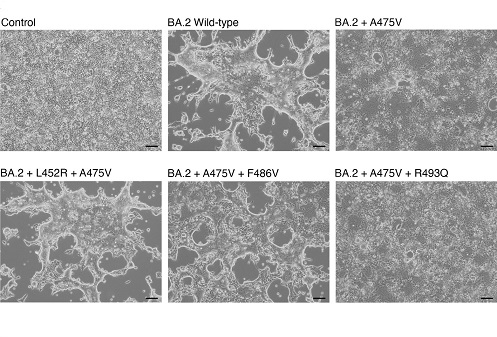Thailand COVID-19 News: Thai Scientists Study Evolutionary Response Of SARS-CoV-2 Variants To Monoclonal Antibody Pressure And Discover A475V Mutation!
Thailand Medical News Team Aug 20, 2023 2 years, 5 months, 2 weeks, 5 days, 16 hours, 41 minutes ago
Thailand COVID-19 News: The relentless evolution of SARS-CoV-2, the virus responsible for the COVID-19 pandemic, has presented an unprecedented challenge to global health systems and economies. The virus's ability to rapidly mutate and generate new variants has complicated efforts to control the spread of the disease. In a groundbreaking study conducted by researchers from the National Center for Genetic Engineering and Biotechnology (BIOTEC) at the National Science and Technology Development Agency (NSTDA) in Thailand, in collaboration with Chulalongkorn University, a novel insight into the emergence of a new SARS-CoV-2 mutation, A475V, has been uncovered. This mutation, identified in the spike protein of the BA.5 variant, is believed to have emerged as a response to selection pressure exerted by monoclonal antibodies (mAbs), shedding light on the intricate interplay between the virus and immune responses.
 Effects of BA.5-specific mutations on cell-cell fusion activity induced by BA.2-A475V.HEK-293T-ACE2 cells were transfected with plasmids expressing BA.2-A475V spike protein with each BA.5-specific mutation in the presence of trypsin. Cell-cell fusion was observed under a light microscope. Representative data from three independent experiments are shown.
Effects of BA.5-specific mutations on cell-cell fusion activity induced by BA.2-A475V.HEK-293T-ACE2 cells were transfected with plasmids expressing BA.2-A475V spike protein with each BA.5-specific mutation in the presence of trypsin. Cell-cell fusion was observed under a light microscope. Representative data from three independent experiments are shown.
The SARS-CoV-2 pandemic has ravaged the globe, infecting over 785 million individuals and causing more than 6.95 million deaths as of July 2023. While the fundamental biology of the virus is understood, its rapid evolution and emergence of new variants remain subjects of intense scientific scrutiny. SARS-CoV-2 exists as a quasi-species, a diverse population of variants generated through mutation.
Although most mutations are neutral or harmful, a minority can confer a fitness advantage to the virus, leading to increased replication rates and potentially enhanced pathogenicity. Factors influencing the virus's evolution include host genetics, immune responses, target tissues, and population immunity through vaccination or previous infections.
One of the most notable variants, Omicron (B.1.1.529), has garnered significant attention due to its potential to evade vaccine-induced immunity. Subvariants of Omicron, including BA.2 and BA.5, have raised concerns regarding their transmissibility and their ability to escape immune responses. The mechanism underlying the evolution of these antigenically distinct variants remains unclear.
However, some evidence suggests that immunocompromised individuals, with limited antibody responses, might act as incubators for viral evolution, allowing the virus to accumulate advantageous mutations. Furthermore, selective pressure from monoclonal antibodies used in treatments could also contribute to the emergence of these variants.
Recent advances in genetic analysis techniques have enabled the prediction of mutations that could confer immune evasion. Mutations like R346T, L452R, K444T/R, N460Y/K, and F486S/P in the spike protein are suspected to alter its structure, making it more difficult for antibodies to bind and neutralize the virus.
However, the absence of certain predicted mutations in many variants underscores the need for continuous surveillance to identify new mutations that could affect the virus's behavior.
>
The study from NSTDA and Chulalongkorn University aimed to explore how SARS-CoV-2 variants respond to the pressure exerted by monoclonal antibodies. The Thai researchers focused on two Omicron variants, BA.2 and BA.5, and investigated their ability to evade neutralization by monoclonal antibody 1D1 (mAb 1D1), which targets the virus's spike receptor-binding domain (RBD).
Intriguingly, while both variants were initially neutralized by mAb 1D1, only BA.5 managed to adapt and grow in the presence of suboptimal antibody concentrations. This adaptation was linked to a single mutation, A475V, in the spike protein of BA.5, which substantially reduced the neutralizing activity of both monoclonal antibodies and convalescent sera.
The study's findings as covered in
Thailand COVID-19 News, shed light on the evolutionary dynamics of SARS-CoV-2 variants under selective pressure from antibodies. The emergence of the A475V mutation in response to mAb 1D1 suggests that the virus is capable of evolving to evade immune responses.
However, the limited prevalence of this mutation in other highly transmissible variants implies that additional factors might be required for optimal viral growth.
These findings underscore the importance of monitoring viral mutations, especially when employing monoclonal antibodies as therapeutic interventions. The emergence of mutations enabling the virus to evade immune responses could have significant public health ramifications. By closely tracking and studying these mutations, researchers can gain a deeper understanding of the virus's evolutionary trajectory and develop more effective treatments and prevention strategies.
In conclusion, the study from NSTDA and Chulalongkorn University in Thailand has illuminated the intricate relationship between SARS-CoV-2 variants and immune responses. The emergence of the A475V mutation in the BA.5 variant, driven by selective pressure from monoclonal antibodies, highlights the virus's adaptability and underscores the challenges of containing the pandemic. As researchers continue to decipher the virus's evolution, their insights will be invaluable in shaping the development of therapeutic strategies and vaccines, ultimately contributing to the global fight against COVID-19.
The study findings were published in the peer reviewed journal: Frontiers In Immunology.
https://www.frontiersin.org/articles/10.3389/fimmu.2023.1219546/full
For the latest
Thailand COVID-19 News, keep on logging to Thailand Medical News.
